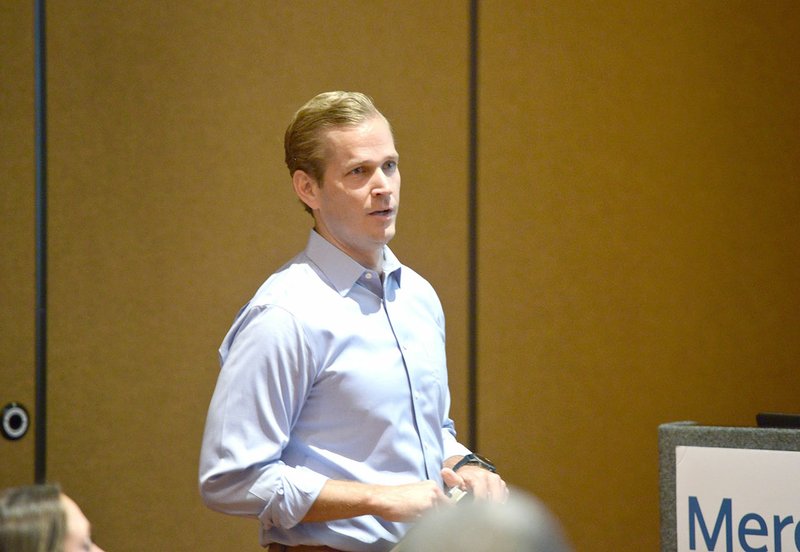ROGERS -- The warnings for youths used to include being careful what their little mouths may say, what their little eyes may see or what their little ears might hear.
Chris Freet took it a step further as he addressed area coaches Thursday morning: Be careful what their athletes post on social media sites.
Freet, the senior associate athletic director for external operations and strategic communications at the University of Arkansas, Fayetteville, since 2014, addressed the issue during the Mercy Sports Clinic and warned coaches of what repercussions could come on themselves or their athletes because the wrong thing was put on display and placed before the entire world on social media websites.
"I think it's a reality," Freet said. "It's how kids communicate today. Since the dawn of time, parents have been complaining about teenagers, right? This is just the thing parents complain about now.
"They're going to make bad decisions. That's part of being a teenager. That's how they learn and mature to be an adult. Let's help them and educate them and put them in the best position."
A prime example of how damaging posting on social media can be is Laremy Tunsil, who had an old video posted on Twitter just before the NFL draft in April 2016. The video showed Tunsil wearing a gas mask and inhaling a substance that appeared to be marijuana as smoke filled the screen.
The former Ole Miss offensive lineman claimed his account had been hacked, but the damage had been done. Tunsil was still chosen by the Miami Dolphins with the 13th overall pick, but the video may have cost him $10 million to $12 million in salary after he was reportedly in contention to the be the first player selected.
Freet, who worked at Oklahoma, South Florida and Miami before coming to Arkansas, said college and NFL teams investigate athletes through their social media accounts, and employers do the same thing to check out possible hirings. He showed the local coaches instances where colleges announced they had withdrawn offers from potential prospects because what they posted on social media sites.
"My eyes had already been open about this because of a few things that happened before," Gravette football coach Bill Harrelson said. "Social media is a great tool for communication, but there is a lot of negative stuff about it. For people, it's easy to do without having to put a face to it or not having to say it.
"If it's not one of the first things I address when practice begins Monday morning, it will be in the top two or three. It could be a lot of trouble, so we need to head it off as much as we can. I tell our players they're responsible to the team 24/7, and that includes social media."
The advice Freet gave coaches included recommendations to their players, such as keeping their social media accounts private until their senior year and to watch who they follow or friend. Something else suggested was to simply avoid being on social media after a loss and not to talk about a rival or future opponent, whether the post was meant for good or bad.
Freet also brought up what he calls the "grandmother rule" -- not posting something that they wouldn't say in front of their grandmothers -- and to refrain from quoting questionable song lyrics because not everybody listens to the same music and the post could be taken the wrong way.
"The biggest thing these days is kids don't get a break," Bentonville High volleyball coach Michelle Smith. "When I was growing up, kids could home and get a break from it all. Today, when kids go home, they're immediately on their phones, although some parents have rules where they take the phone when their kids get home.
"As a staff, we try to stay very aware of what they are doing on social media. A benefit to us at Bentonville is our deans of students are well-aware of the situation. They're looking and keeping us informed if there are red flags that come up. We encourage our players to have positive posts and stay humble, but you can't control it all."
Freet also advised that the newer the social media site is, the higher the risk of using it until people learn how to use it the right way.
"As things mature and are around longer, people figure out how to operate them the right way," Freet said. "Snapchat had a lot of issues early on and was not widely received, and now as it's grown it's become more acceptable. Facebook is something everyone is on right now."
Sports on 07/29/2017

